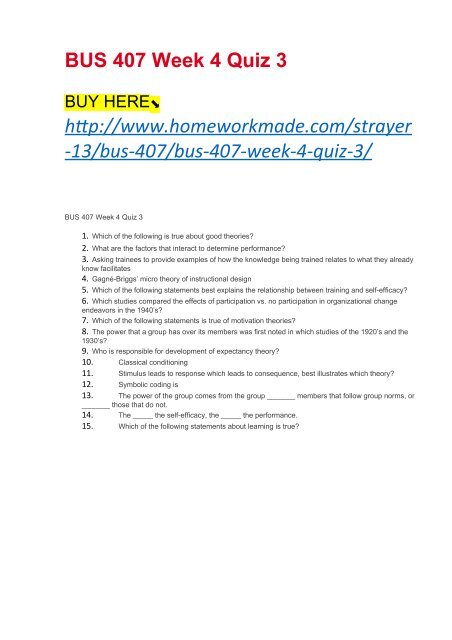Create successful ePaper yourself
Turn your PDF publications into a flip-book with our unique Google optimized e-Paper software.
<strong>BUS</strong> <strong>407</strong> <strong>Week</strong> 4 <strong>Quiz</strong> 3<br />
BUY HERE⬊<br />
htp://www.homeworkmade.com/strayer<br />
-13/bus-<strong>407</strong>/bus-<strong>407</strong>-week-4-quiz-3/<br />
<strong>BUS</strong> <strong>407</strong> <strong>Week</strong> 4 <strong>Quiz</strong> 3<br />
1. Which of the following is true about good theories?<br />
2. What are the factors that interact to determine performance?<br />
3. Asking trainees to provide examples of how the knowledge being trained relates to what they already<br />
know facilitates<br />
4. Gagné-Briggs’ micro theory of instructional design<br />
5. Which of the following statements best explains the relationship between training and self-efficacy?<br />
6. Which studies compared the effects of participation vs. no participation in organizational change<br />
endeavors in the 1940’s?<br />
7. Which of the following statements is true of motivation theories?<br />
8. The power that a group has over its members was first noted in which studies of the 1920’s and the<br />
1930’s?<br />
9. Who is responsible for development of expectancy theory?<br />
10. Classical conditioning<br />
11. Stimulus leads to response which leads to consequence, best illustrates which theory?<br />
12. Symbolic coding is<br />
13. The power of the group comes from the group _______ members that follow group norms, or<br />
_______ those that do not.<br />
14. The _____ the self-efficacy, the _____ the performance.<br />
15. Which of the following statements about learning is true?

















